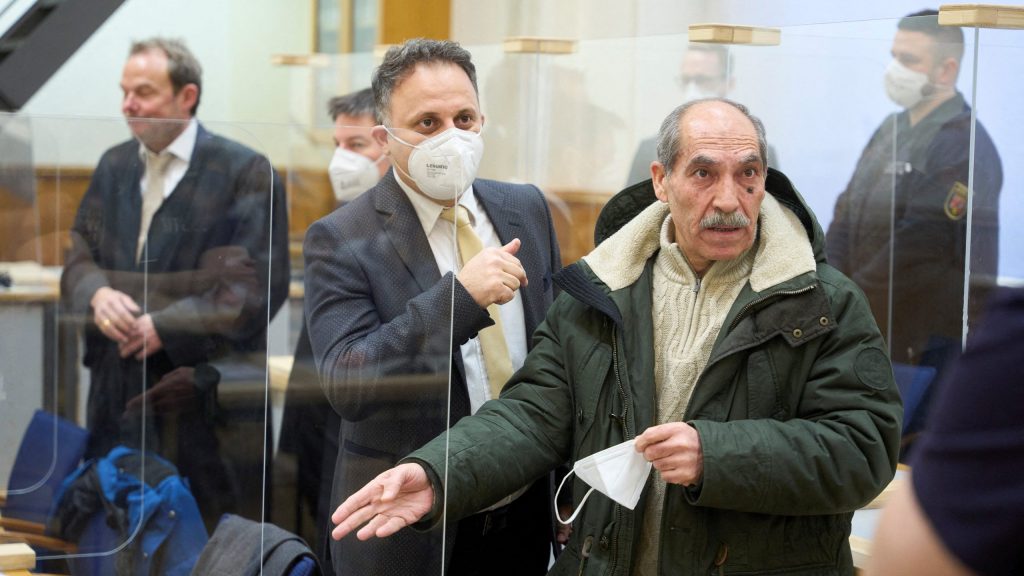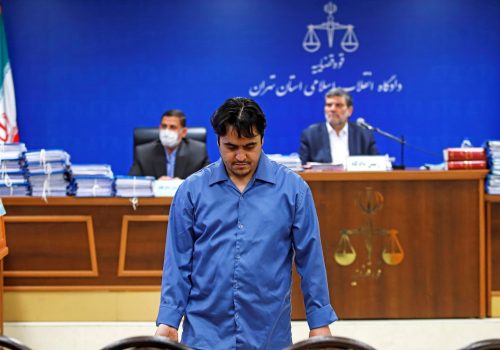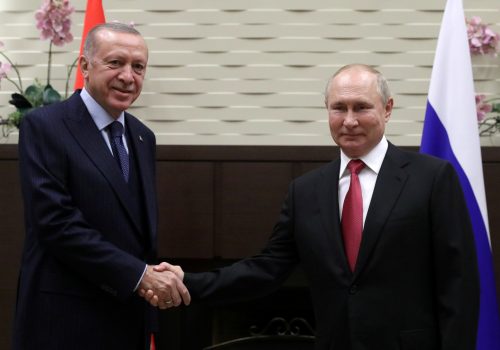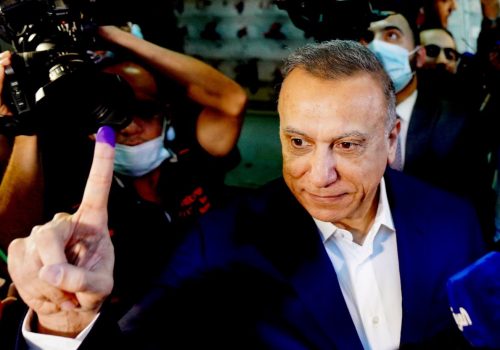Human-rights activists are applauding a German court’s sentencing of a former Syrian intelligence officer to life in prison for crimes against humanity that were committed at the outset of the Syrian conflict.
A onetime colonel in Syrian President Bashar al-Assad’s army, Anwar Raslan, 58, was found guilty of murder, sexual violence, and torturing prisoners—the first-ever conviction of a high-ranking regime official for atrocities during that war.
Now activists are hoping that Raslan’s conviction paves the way for other bad actors associated with the Assad regime to be similarly punished. Our experts weighed in on what Thursday’s sentencing means for that effort.
Europe is no safe haven for war criminals
The trial we just witnessed is not justice, but a step toward another important concept if Syria is to ever stabilize: accountability. Impunity has been the only constant for the last eleven years—for enforced disappearances, sieges, torture, theft, displacement, and mass killings. But Thursday’s verdict reminds criminals who collaborated or worked on behalf of such regimes that Europe does not offer them safe haven, and that they will never be safe from prosecution for their crimes, even a decade after they’ve committed them.
Raslan fled in 2012 and has been punished for his role in the deaths of twenty-seven individuals and the torture of four thousand others. But there are many like him, who have committed far more gruesome crimes, and who beg prosecution. Truth and reconciliation and accountability are necessary ingredients for societies to move past horrific civil wars. It’s simply not a step that can be skipped if Syria is ever to experience peace and stability.
It’s significant that Germany played a leading role in ensuring accountability for crimes in Syria, and it’s worthy of deep respect. Many lawyers are hopeful that France, Sweden, and the Netherlands will also host national trials in the coming months and years for Syrian victims, given that deadlock at the United Nations (UN) Security Council currently prevents referrals to the International Criminal Court in The Hague.
The true heroes here are the Syrian victims who have stepped up to testify and put their lives at risk in the process, as well as the many Syrian lawyers (such as Joumana Seif, Mazen Darwish, and Anwar Bunni, among others) who pursued these crimes and worked with victims to collect materials that met the standard for a court of law. Although these Syrians were forcibly silenced in their own countries, they are finally being heard in a judicial system that offers them more opportunity to speak than Assad’s courts ever have.
Still, there’s much more work to be done. Despite pushback from Russia, Iran, and other Assad allies, the United States can, and should, continue to support the UN’s legal mechanisms, such as the International, Impartial, and Independent Mechanism, and give serious thought to the establishment of an international court dedicated solely to crimes in Syria. It’s in the United States’ interest to support accountability efforts, including evidence collection, legal training, and diplomatic pressure, to make sure violations committed during the Syrian conflict are accounted for.
—Jomana Qaddour is a resident senior fellow at the Atlantic Council’s Rafik Hariri Center and Middle East Programs.
How to bridge the ‘accountability gap’
Thursday’s historic verdict was as much about the sum of its successes as it was about the lessons it offers for the future.
First, the successes: The verdict was possible due to the determination and strength of victims and survivors, as well as the commendable efforts of investigators, prosecutors and NGOs. It shows what a dedicated, well-resourced war crimes unit can achieve—not just in Germany but in other national systems with the ability to try crimes under the principle of universal jurisdiction.
Now the lessons: The conviction represents only a fraction of the crimes committed during the Syrian conflict. While national courts have admirably tried to patch the accountability gap that has resulted from the international system’s inaction, more must be done to hold perpetrators accountable and to ensure that victims and survivors are more included in the process.
First, justice-minded states must continue to ensure that others in the Assad regime are held responsible for the full spectrum of offenses, including enforced disappearances, the use of chemical weapons, the deliberate bombing of hospitals and health workers, and more. The role of other states in the violence—ranging from Assad allies Russia and Iran to Qatar and Turkey—must also be explored.
Second, the states that can prosecute these crimes should ensure all possible domestic legal barriers are removed. The recent decision of the highest court in France—which holds that French courts cannot prosecute crimes against humanity committed in Syria because of the requirement of “double criminality”—is a negative development for justice that should be reconsidered. Claims of immunity for senior leadership in the Assad regime, as well as allied states that perpetrated, aided, or abetted attacks on civilians, should not be an obstacle to justice.
Third, efforts should be made to ensure that the process of delivering justice is accessible to affected communities. In the case against Raslan, for example, the lack of simultaneous Arabic translation for the broader public meant that many could not meaningfully engage with the process. In future trials, victims and survivors should be encouraged to come forward and provided adequate support and protections. The ongoing “normalization” with the Assad regime should not cause some European states to force Syrian refugees to return to Syria, especially when those same refugees might be participants in these justice processes and when they are at continued risk in their home country.
And finally, justice for harms is not a substitute for preventing the harms from happening in the first place. The crime of enforced disappearances was notably not charged in the case against Raslan, despite the pervasive perpetration of enforced disappearances by the Assad regime in Syria. Energy and resources should be invested in a mechanism to address the fates of the disappeared, alongside increased resources to national war crimes units, the UN’s Syria Commission of Inquiry and the UN’s International, Impartial, and Independent Mechanism.
—Gissou Nia is the director of the Atlantic Council’s Strategic Litigation Project.
‘Syria fatigue’ threatens to derails efforts at justice
This verdict is inarguably a landmark decision. Yet it also reflects the severe lack of accountability in the Syrian conflict. The fact that a colonel (who was neither a central regime figure nor key decision maker) is the highest-ranking official to face prosecution in a ten-year conflict that has seen (and continues to see) some of the most heinous atrocities in modern history highlights the failure of international human-rights law and justice.
Problematically, the verdict comes at a time when the international community is facing severe Syria fatigue. Multiple Arab countries have begun normalization efforts, Interpol has allowed Syria to rejoin its network, and some European states—including notably Denmark—have revoked refugee status to Syrians on the basis that Damascus and its surrounding suburbs are safe enough for return.
Given that Raslan defected in 2012, in the early stages of the conflict, one can only imagine the extent and depravity of war crimes and crimes against humanity that have been committed since then. To date, there are more than one hundred thousand Syrians missing with little to no information about their fate or whereabouts. Countless reports, witness testimonies, and photographic and written documentation have revealed the widespread use of torture, sexual violence, body mutilation, and murder, among many other crimes.
As the international community moves towards prioritizing humanitarian efforts over a political transition and human rights in Syria, the Raslan verdict should be a stark reminder that the Syrian conflict is far from a humanitarian one. Until accountability and justice are truly prioritized, Syria will never be safe enough for return.
—Reem Salahi is a nonresident fellow with the Rafik Hariri Center and Middle East Programs.
Further reading
Thu, Jul 29, 2021
The US needs better tools to fight transnational repression. Here’s where to start.
New Atlanticist By Gissou Nia
As autocrats reach beyond their borders to punish their opponents, the United States must meet the challenge by preparing effective, forward-thinking policy.
Fri, Oct 15, 2021
Are Putin and Erdogan doing territorial swaps in Syria again?
MENASource By
Talks of another territorial swap are back on the table now, amidst a common Turkish-Russian belief that the US is preparing to disengage from the Middle East, as they did with Afghanistan.
Fri, Dec 17, 2021
2021: A year in the Middle East
MENASource By Holly Dagres
2021 was a year full of impactful elections, historic anniversaries, and new challenges for the Middle East and North Africa.
Image: Syrian former colonel Anwar Raslan arrives in court before the verdict in his trial for crimes against humanity in Koblenz, Germany, January 13, 2022. Photo by Thomas Frey/Pool via REUTERS



